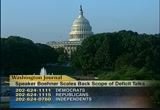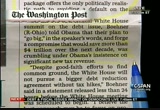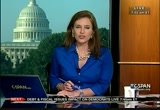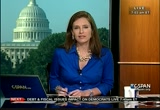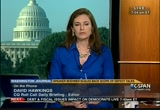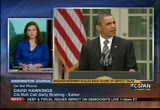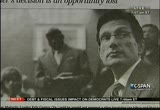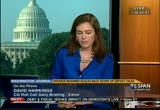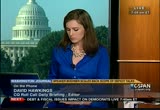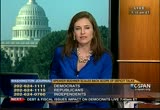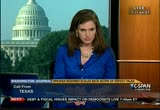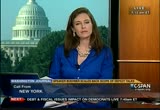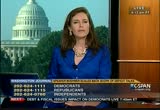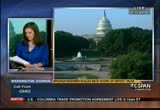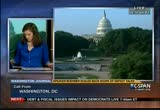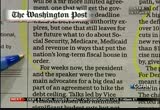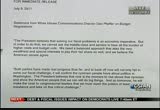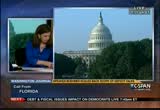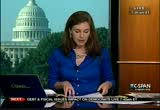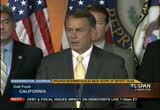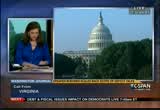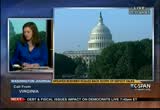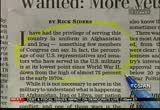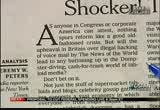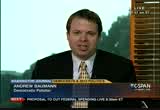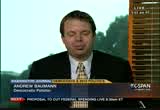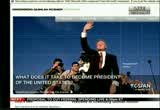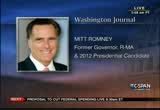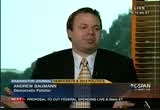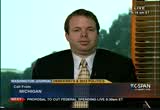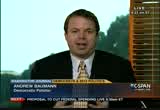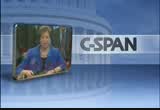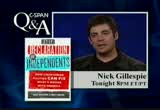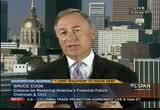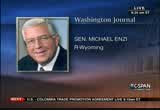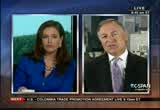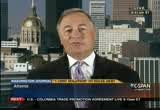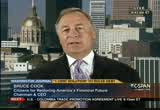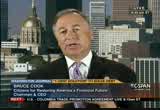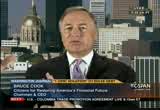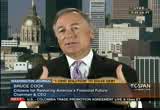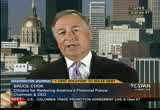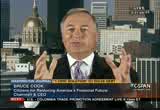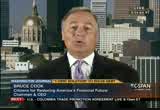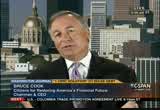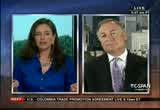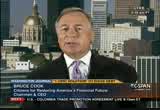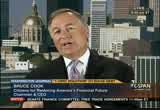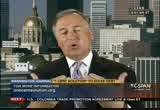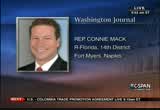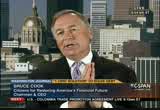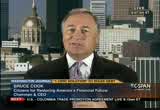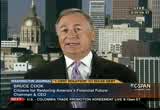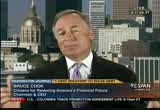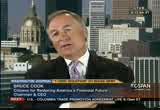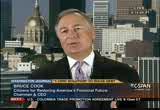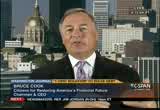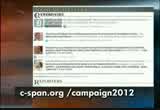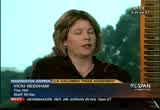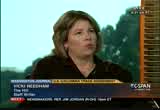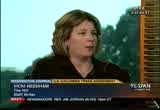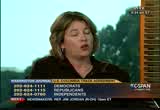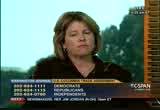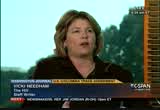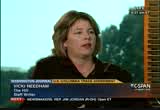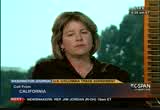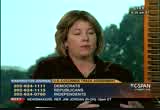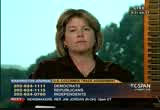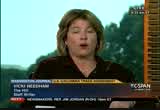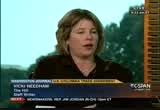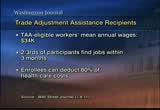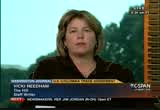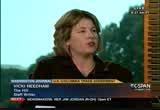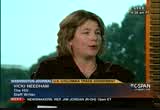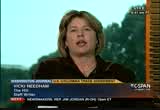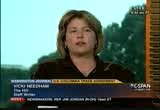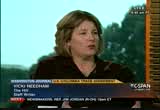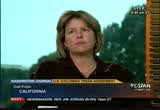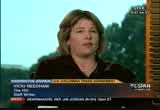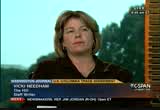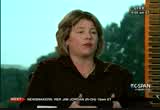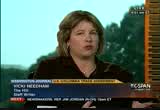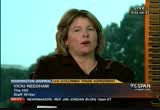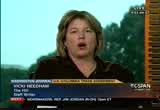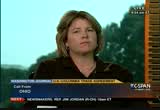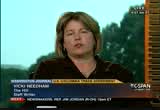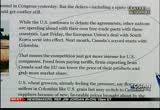tv Washington Journal CSPAN July 10, 2011 7:00am-10:00am EDT
7:00 am
the federal deficit. we continue our look at u.s. trade deals with a hill staff writer who talks about united states-columbia trade agreement was signed on november 22, 2006. "washington journal" is next. ♪ host: good morning and welcome to "washington journal." house speaker john banner has scaled back the scope of the deficit talks moving the target from $4 trillion in savings over a decade to in the range of 2-$3 trillion. he will meet with the president and talk about the budget cuts today. our question 40 this morning is -- what do you think about the
7:01 am
7:02 am
7:03 am
, mantis is this the shift? guest: i don't think it is that momentous. the flurry of talk last week about going big and swinging for the fences were underscoring the idea of the president and the speaker to persuade the democratic and republican rank- and-file to go for something as big as $4 trillion. it was a long shot to begin with. both sides decided to spend a few days pursuing this long shot and it turns out that speaker behner blinked first. he was the first one to realize publicly that he did not have the votes in his own troops to get this through because it would require too much. host: if the number goes down from $4 trillion, what gets left behind? guest: you go from $4 trillion
7:04 am
down to something. the fall back number we think is $2.50 trillion. that is the amount of deficit reduction that would be necessary to get republicans to vote for an equivalent amount of debt ceiling increase. that is what is required to keep the treasury in the flush to get for the next election. that is the number and we know that the vice president had six members of congress and they were pretty close. they were at about $2 trillion. entirely from the spending cuts side and from limits on entitlements, farm subsidies, maybe, and some other lesser entitlements that don't have the
7:05 am
political punch of medicare and medicaid. in theory, they are most of the way they're on a deal with that would get them to $2.40 trillion but the assumption is to get from that will require revenue increases. that is still the sticking point. how much the republicans will be willing to allow revenue to go up and whether they will allow it to be called -- they won't allow it to be called a tax increase -- they might allow it to be called a revenue increase or some other euphemism. host: speaker banner and president obama are the two key players in this. how has that relationship been going over the last few weeks. we have seen images of them playing golf and meetings that they have had privately. how much are we looking to these two men as opposed to all the other congressional leaders? guest: it is up to these two,
7:06 am
really. they seem to be -- they seem to understand each other's political imperatives which is that both want to be seen -- as the unambiguous leaders of their party. both of them have dealmaking in their heart. mr. behner is a deal maker from way back. back when he was the chairman of the house education committee, it was john boehner to cut a deal with ted kennedy on the no child left behind law. he knows how to cut a deal and the likes to cut a deal. he feels like that is good government at its best. the president, likewise, would like to cut a deal. if anything, there was some worry that the two, from the rank-and-file, that these two leaders would be so interested in cutting a deal that they would essentially cut a deal
7:07 am
that could never get through congress and would look worse in the end. the end. it now seems like the two of them are bound and determined to get something that can get through their caucuses. host: we have heard from minority leader nancy pelosi, talking to reporters on friday from congress. other people are involved in this process. how much do you expect to hear their messages this week? do they have more sway now that the go big deal is off the table? >> i think they do. the person to look to the most is probably eric cantor who is the house majority leader, who is the number 2 and the republican hierarchy. he was the only house republican in the biden talks. it was he who pulled the plug on the biden talks a few weeks ago by saying that he could not support any revenue increases and he was going to withdraw
7:08 am
from the talks and lead to the president and the speaker. president and the speaker. politically, anything that eric cantor refuses to support can't get through the house. he is arguably more in touch with the conservative rank and file in the house. if he says this is a deal that is good enough for him, the votes will probably be there to get through the house. probably the same could be said of nancy pelosi as the house minority leader. the house democrats are a pretty liberal bunch of these days. if she says that whatever entitlement cuts need to be part of the deal and if she supports it, she can probably get the votes on her side. this will still be a deal that will need to get through the congress with good numbers for both republican and democratic votes, probably a majority of republican votes. and in a near majority of democratic votes. host: speaker behner referenced
7:09 am
the biden talks and said he would like to get back to that number. majority leader kantor pulled out of that. do we pick up where they left off? how does the bided work to go forward? >> they are picking up what they left off. they will try to do something bigger and they are back to where they left off. the biden talks had gotten to $2 trillion mostly in spending cuts and lesser entitlement reforms like farm subsidies and now they need to find another 400-$500 billion on top of that and that will require revenue increases almost certainly and this is where they are stopped.
7:10 am
the talks are rapidly winding down. if they don't get a handshake agreement this week, it will be very difficult bulk mechanically in terms of writing the bill and in terms of rounding up the votes to get this done by the august 2 deadline. host: david to hawkings, thank you for joining us. we are talking this morning about the deficit talks. here are the numbers -- here is a comment from twitter -- let's go to the funds, texas, on the independent line, good morning. what do you think about the news coming out late last night?
7:11 am
caller: i look at speaker behner and the president in the same light as speaker gingrich and president c clinton were doing their thing. if you are familiar with what was happening behind the scenes with the president and newt gingrich, i think that is what is happening right now. they are trying to solve the they are trying to solve the problem where you have a bunch of people that don't really want to see eye to eye and don't will want to deal with the problem as they see it. host: where does that take us? what happens next? caller: the biggest problem i see is the fact that congress does not want to curtail the
7:12 am
military-industrial complex. they don't want to curtail the financial world which caused a lot of this area. there are a lot of sacred cows that are not being talked about host: let's go to twitter -- richard, republican, new york, what to do you think? caller: can you hear me? host: weekend. caller: i want to say that i am disappointed in cspan. you have now read these segments to such a small hyper- focused, it is difficult to get a broad cross-section of people who are informed on the issues to call in and have an interesting opening of one mind in these discussions. forknowyou no longer ask
7:13 am
articles. it is unfairly focused that it renders the discussion -- you need a political science degree. i am very disappointed. host: would you like to see more open phone segments? i think we lost him. let's go to watertown, n.y., on our democrats line. welcome. caller: the republicans and the banks caused us all this trouble. i became a citizen of the united states. i have never seen any more disrespect for the president. the american people need to be learning about democracy. the republicans and the tea party need to be fired.
7:14 am
7:15 am
talks setting of $4 trillion is off the table. the talks will continue tonight the talks will continue tonight at the white house and we want to hear what to think about it. caller: good morning. thank you for cspan. i think as long as you have these people saying bad side does this or this side does that these people never get anywhere. it is like two teams fighting each other all the time. one is never going to hand the ball to the other team. i have a suggestion -- when they come into the chamber, i think they should each get a number and go to that seat. that would put these people together in a mandatory way. when these people get up to speak, i think they should have
7:16 am
to give an oath that what they say is the truth. because none of them do. that is all i have to say. host: republican, right here in washington, d.c., good morning. caller: i like to look at this as a continuing negotiation getting closer to the deadline. my understanding is that john boehner and the republicans were dealing with a 10-year timeframe where they were looking at $4 or $2 trillion and obama was looking at an 18 month timeframe to get through the election. as we get closer to august 2, i think, they need to narrow the talks. i certainly would not categorize this as john boehner blinking. i would say they are possibly getting closer to talks. one person who i think should be brought into this is tom coburn.
7:17 am
he is the one trusted voice in the united states to i think needs to be brought into this. he has expertise in the area of health and medicare. my belief is that malpractice reform and tort reform should be included in any final deal even if it has to go beyond august 2. john boehner needs to do a two- step rather than a one-step. i support john boehner on this and not obama. at "thet's take a look washington post" -- let's go to jackson, fla.,
7:19 am
democrat line, good morning. democrat line, good morning. caller: the gentleman already know the plan. when you have the speaker of the house and the president made together, you know it is already a done deal. in an election year, is already planned out. host: you think this is playing out to a script? i think we lost him. let's go to david on our independent line, good morning. caller: i think representative behner is being reasonable and that is the whole idea behind having the congress is negotiations. our way or the highway is not
7:20 am
going to really get us anywhere. you can harken back to newt gingrich and bill clinton back when they had their little showdowns, the republicans blamed and clinton raised taxes and the economy took off like a skyrocket the manufacturing base was sold out due to republicans. this may happen again. i think my way or the highway will not get us anywhere. the rich should pony up a little bit, thank you. host: risen other comment on twitter -- let's take a look a comment from the white house communications expert he says the president police solid our fiscal problem is an imperative but in order to
7:21 am
do that, we cannot ask the middle class and seniors to bear all the burden. we need a balanced approach. let's take all look at another leader making comments, this time minority leader nancy pelosi who issued this statement -- fort wayne, indiana, republican, good morning. caller: it is how they talk about revenue increase. everybody in the press says this and yet they failed to tell the american people that is a tax increase.
7:22 am
the debt has risen 61% under nancy pelosi. i was watching c-span with my daughter who is 12 years old and we sat there and sought joe biden said we had to keep spending and my daughter looked at me and asked if he was retarded. it is a shame that the people that we elect are not responsible host: be careful with the use of that word. we don't want to insult our viewers. that might bengs considered to be insulting. let's look at what house speaker behner had to say.
7:23 am
new york, mark is on our democrats line. caller: i don't get a chance to call but often because i work. you guys have a show of the difference between democrats and republicans. the people don't seem to know the difference. they need to know which party helps them. helpepublicans don't anybody. they are on social security and people vote for republicans. they will not give them anything. they will not help them. the distance between republicans and democrats is tremendous and people watch c-span to have --
7:24 am
and i think cspan should have a show on the difference between them. host: let's look at the folks who may be at the meeting today. there will talk about the ongoing efforts to work out a debt ceiling agreement. that is going hand in hand with a budget agreement john boehner will be there as well as harry reid, mitch mcconnell, also expected is representative nancy pelosi, eric cantor, the majority leader in the senate and senator john kyl the republican leader in the senate. also steny hoyer, the democratic whip. there is a statement that harry reid put out -- i am disappointed that the
7:25 am
republicans would not work with us. john boehner said his big concern was that the president had tax issues on the table which republicans did not find tenable. let's go to miami down -- miami, fla., independent. caller: i think every a motor -- yet -- every modem -- every american voters should keep in mind. they put the iraq war on a credit card. when i talk about obama increasing the debt, we have to pay for these wars. the republicans left it for the next generation to pay. republicans have overplayed their hand. i don't think they are looking good now to the american people. tax cuts will not get me to hire people. what will get me to hire is when i need more people.
7:26 am
i don't need more people now because i don't have the demand. we need to increase the demand by putting money into the pockets of average folks. this is not the time for cost cutting, not for the government. they need to pump money into the economy. there is a huge vacuum cleaner on top of us which is the private sector sucking money out of the economy as somebody has to put some money into the economy. that is the government's job right now. we have a debt problem and we need to have a plan and how to reduce the deficit in the long run but in the short term, put people to work host: let's take a look at an e-mail. let's look bad "the new
7:27 am
york"york reporting -- huntington beach, calif., a republican line. good morning. caller: i am a little bit disappointed that speaker john boehner crumbled. little bit. $4 trillion was not unreasonable. you have to quit collecting speakers by seniority and more to the mettle of the man and maybe he would've stubbed their and swung back a little bit.
7:28 am
crumbling like that is no good and that is the way it goes. host: since you are a republican, speaker john boehner said there were concerns in his party that there would be tax increases. did that worry you? caller: not really. the other side has to be defeated. you cannot give them any more ground. they have bad ground for the last 50 years. the ground is gone and we are at the edge of the cliff and they are trying to push us over. it is just not working. you have to have those deep cuts, that is all there is to it. host: from twitter -- sunrise, fla., democratic line, good morning. caller: i think speaker john banner would rather spend more time golfing. our president does not need
7:29 am
the republican support. there is amendment 14, article 4, he can sign checks of the wants to. we need jobs in this country to put revenue back into our treasury. it seems the corporate people are sitting on almost $3 trillion and they refuse to give us jobs and are more interested in going to brazil or china to start jobs there. the republicans know it. they don't seem to care. that is where the job creation is being done. host: you mentioned the president could go ahead and deal with this issue himself. what do you think that would do? do you think that would have any repercussions politically? caller: the republicans say he better not go in that direction. we have to pay our bills for the debt ceiling was raised seven times under george bush. you never heard about the debt
7:30 am
ceiling but under obama, the debt ceiling has to be raised to pay our bills, bills where they put $9 trillion on to the deficit, the republicans. i don't get it. host: richmond, va., independent caller, good morning. caller: good morning, i want to say that the republicans are really not talking about cutting defense. right after 9/11, january of 2002, ashcroft announced that two points -- an estimated $2.30 trillion went missing in the pentagon. that is $2.30 trillion that we could be putting toward jobs. i am 25 years old and i just graduated and i cannot find a job in my field in biology. i do not want to go back to school and spend $40,000 for an education where i can't find a
7:31 am
job afterwards. nobody is talking about the defense. we -- our defense budget is more than rest of the world combined. we have over $300 billion a black projects that gets thrown at the military and nobody knows where it goes. it seems like the republicans come into office and they don't talk about cutting defense. i live in northern virginia and i go to redskin football games with all these defense contractors and they are everywhere in northern virginia, everywhere. the republicans aren't just not talking about it. 11 eric cantor's district in richmond, virginia and i am very disappointed that as a senior leader, he is walking away from a very important discussion. host: let's go to twitter --
7:32 am
a question for you this morning is what you think about house speaker john boehner's announcement last night to scale back the scope of the deficit talks because it is more realistic. he wants to make cuts and change the budget over the next decade rather than the go big plan of $4 trillion. let's look at the other news -- this is a new country that has
7:33 am
just formed and secretary of state hillary clinton weighed in with her comments in "the washington post." she says there is reason to hope for a better future. the leaders of north and south sudan should commit to the hard work ahead. that is from hillary clinton in "the washington post." from the op-ed page -- that is from "the washington
7:34 am
7:35 am
our question this morning is announcement that speaker john boehner wants to scale back the scope of the deficit talks. let's go to marshall, texas, republican line. caller: i hate to see speaker john boehner pullback. we need to address this problem. a couple of trillion dollars over 10 years will not do it. when the republicans controlled congress up until 2006 and the democrats took over in 2007, our deficit was under $500 billion. since the democrats took control of congress and got a democratic president, we are running $1.50 trillion.
7:36 am
if we can get the deficit back down to the george bush era, we would not have this kind of problem that we are facing right now. everybody wants to talk about the wars in iraq and afghanistan. george afghanistan. george bush left office, he left a deficit of under $1 trillion. that is an obama stimulus package for one year and that was enough to hold us in iraq and afghanistan for seven years. host: let's go to a democratic caller in brooklyn, new york. caller in brooklyn, new york. caller: i think the numbers of the other caller are totally false. obama should keep his footing in this situation. the republicans say they will walk away and limit the amount of money but they will talk about that is on the table is
7:37 am
preposterous. it is showing that they are scared and they are finally realizing that obama has an understanding of the economy and he has an understanding and backing of the people. right now is the time to change the way we need to move forward in terms of fiscal responsibility and in terms of paying our bills. with john boehner trying to figure out which way his caucus will both and which -- vote, he will lose his job and we will not be able to rectify the things that are wrong with the economy. it is because of the way he is acting, we will be able to move forward because he will lose his job. independentgo to in caller in hackensack, new jersey, good morning. caller: good morning, i think both sides have a completely
7:38 am
wrong. the real issue is the federal reserve bank. there is a video you can see on bogle which i encourage every american to watch. we're not taught in school. it is called "the money masters" and gives it a history of the federal reserve bank. our founders learn specifically from europe and they did not want private bankers running the country. they issued that only our treasury should issue money. when our government borrows money from the federal reserve bank, they have to pay this debt back plus interest and this is why we will never ever get out of debt. the few presidents that changed this and have our own national bank without private bankers making interest got us out of debt over history. every american, every politician
7:39 am
must watch this video on google. it is called the "money masters." when we can issue our own money and get these private bankers out of our government, we will end wars and and all this stuff which shows through history that they have caused a depression and war is. s. it only makes the money. host: let's go on to another discussion today. newsmakers," by" jim jordan weighs in on his take on whether corporate tax increases would be okay in a fiscal deal? >> does it mean tax increases and the way that you close loopholes and tax subsidies for corporations? >> there is no way the
7:40 am
republicans will be in favor of raising taxes. that is the wrong approach to take. even the president understood this last september. we're trying to get our economy growing. the last thing you want to do is burden small business owners and families with additional taxes. we think it is bad economics and bad for job creation. host: that a representative jim jordan, republican of ohio speaking on this week's " newsmakers." for more information, go to c- span.org. republican, good morning. where are you calling us from? caller: 0 high, california, thank you for cspan.
7:41 am
it is mind-boggling that we are considering raising ceiling on a house of debt which is so severely in desperate i have two points. i think history will reflect on this president and this administration as one of the most economically careless, naively driving this country to the practical edge of bankruptcy. secondly, i commanded steve jobs. when he re-took apple corporation when it was crashing, he took a salary of $1 here in california. we had our legislators get a cut in pay. i call on the president and the leaders of the house and senate to ponder giving up their precious salaries to help fund what they feel is so important in this recessionary period. host: let's go to our next
7:42 am
caller from cleveland, ohio, on our democrats line, good morning. caller: i often hear president obama called naive. naive, it would be when he was told that he would be working with honest americans. when eric cantor walked out of the talks, they're not talking about tax cuts. they're talking about subsidies, corporate welfare. $7 billion per year that we get to exxonmobil will make $5 billion in profits per hour. host: arizona, good morning. caller: good morning. how're you doing? host: what do you think about the news of the deficit talks? caller: neither side seems to be working together to help this
7:43 am
thing. how come nobody brings up medicare and have come obama borrowed $5 billion from medicare to pay for his and nobody wants it? host: how you think a deal can be struck? caller: i don't think they can. neither side is working together on this. host: let's take a look at some other stories in the news -- this is the final front page of
7:44 am
7:45 am
coming up we will talk with an activist who has managed to get some attention here in washington with his own message called the one-cent solution to solve the debt. >> sunday afternoons, cspan readers talk shows. discussions today includes the debt and the future of space travel. we begin at noon eastern time with nbc's "meet the press." they will have treasury -- secretary of the treasury tim geithner. and then tim pawlenti. at 1:00 eastern, "this week"and
7:46 am
they will have bill daley and the newly appointed international monetary fund managing director, cristina guard. fox news sunday begins at 2:00 and they will have much mcconnell and senator jim demint. on the debt plan. at 3:00 p.m., stay"of the union"will have the ranking democrat on the house budget committee. also rick santorum on his bid for the republican presidential nomination and then james a. garvin, a chief scientist at the nasa space center on the future of space travel. at 4:00 p.m., it is "face the nation"who has secretary of the treasury tim geithner and alabama senator jeff sessions and florida senator bill nelson.
7:47 am
the five network tv talk shows are brought to you as a public service by the networks and cspan. begin at noon eastern. eastern. you can listen to them all on cspan radio on 90.1 fm in the washington, d.c. area. you can listen under blackberry or online @ cspan radio.org. >> who is really going to get fired? nancy pelosi and john boehner are proxies' for the incredibly narrow range of choice we actually have been political -- and elected officials. >> in the declaration of independence, reason tv editor
7:48 am
in chief takes on the problems of the two party system and the possible libertarian solution tonight on c-span "q &a." cspan has launched a new easy to navigate the web site for the 2012 presidential race. visit us at c-span.org/ campaign 2012. >> "washington journal" continues. host: andrew bauman is with us. the latest news about the house speaker's announcement that it wants to scale down the scope of the budget talks and change the target number, what do you think democrats will do?
7:49 am
guest: i think this is probably politically good news for the democrats. the reason this is hard to get a bigger deal is because both sides need to make tough political choices. the democrats would have had to do bigger entitlement cuts. you could see nancy pelosi's reaction to this. the fact that democrats don't like at that -- have to take about and this is good news. the larger issue for democrats is when it comes to fiscal issues, democrats enter the debate with a lack of credibility. they had been seen as the party of big spending in government. right now, voters are in a position where they want to see less spending. one gets down to specifics, they
7:50 am
are more on the side of democrats. the paul ryan plan is very unpopular but the measures the democrats propose like increasing taxes on the wealthy and ending subsidies for corporations is very popular the democrats need to reach a credibility threshold on fiscal issues. they need to be willing to say that we need more government accountability. if they can agree to a down payment and get a boat on the record of cutting spending, it helps them reach that far. they want to move to a larger debate where the public is on their side about priorities and what is the next step. they want to from that republicans want to eliminate medicare for those under 55. they can cut some things that will affect the middle class since seniors but we want to end the subsidies for oil companies
7:51 am
and the jets owners. if they can get bear rather than debate about cutting spending more or less, going into 2012, there will be a good position. host: let's look at this from "the washington post" -- let's talk about the idea of the present willing to boost taxes. both sides have a different way of talking about taxes. bring us through what the polls say. guest: no one wants their own taxes increase.
7:52 am
d. nobody says they support higher taxes. voters think dead any deal should incluse -- include some tax increases. in a gallup poll, they asked if taxes on certain groups are too high or too low? the middle class thought the taxes were way too high and on the wealthy, it was a 40% margin. voters think taxes should be part of the deal and they want tax increases this of the great on the wealthy and corporations. 75% support letting certain tax cuts and expired. voters think we should take these steps in addition to killing spending. speaker john boehner is putting
7:53 am
them cells outside the mainstream public opinion. host: your of the vice president at greenberg a desk quinlan quinlan. voters do not think anyone can solve the profound economic problems. guest: yes, voters are very cynical. they clearly rejected republicans in 2010. we see that republicans have continued to lose credibility but democrats have not seen an increase. it is a pox on both houses. we asked who will do a better job on the economy and the deficit. 40% say one thing but we have seen a huge increase in nither. they say everyone is doing a bad job.
7:54 am
host: this article goes on to say that looking at this particular bulk of the electorate which to call the rising american electorate, on married women, younger voters, -- guest: ever be the focus is on independen \ts. these are the voters that turned out in record numbers in 2008 and supported obama by huge margins. while democrats need to win independence over, they need to excite the rae and boost their margins. if they win independence, they will not get what they need to do. democrats need to address the metal electorate -- the middle
7:55 am
electorate. what we have seen in our polling, president obama has been trying to make the case for a long time that things are getting better. he uses the analogy that the republicans drove a car into the ditch and he is trying to get it out. only 35% of voters think the economy is getting better. we'll see a rising number of people in our survey saying that they are losing income. these voters are feeling hammered by the economy. they want to hear present obama and democrats talk about the future and what their plans are to change things and get the middle class to keep jobs and
7:56 am
moving overseas. that is a big issue for them and it changes the political structure in washington. they see lobbyists and special interest getting the breaks. democrats really need to address these concerns for these voters. host: york firm says it is about the message. -- your firm says it is about the message. guest: it is difficult. democrats and president obama made really tough choices. they have helped somewhat. most major economists say they have prevented a much greater recession. and have jumped -- and
7:57 am
prevented jobs employment -- job unemployment from jumping higher. i think obama has done a good job and the economy would be much worse off if he did not take steps but voters don't want to hear that. host: let's go to the phones. dallas, texas, independent line, good morning. caller: the real problem with the democratic party is that we have a president who basically can't confront and cannot fight and therefore there is no such thing as negotiations from a position of strength. the democratic party to come up with someone to run against obama next year. guest: i feel your frustration. people have felt that president obama as often negotiated with himself. himself. they feel the present obama is
7:58 am
the standard bearer. about thes talk presidential candidates. what do your polls show about the strength of those candidates who have announced an even the ones who have not announced. guest: obama is not in the best position now and we will see how that changes over the next few months. it may be that the republican field is weak. in terms of a general election, met romney is their strongest opponent. obama is about even or a little higher. higher. some of the other republicans like michelle bachmann and sarah palin if she were to run, would
7:59 am
get thrashed and they are not in a position to take things on. they are not well known but their positions are so far out of the mainstream when you look at sarah palin are michelle bachmann. i don't they are electable. maybe tim pawlenti is flexible but he is struggling with the republican primary to keep -- to catch fire. you have rick perry and he will be an intriguing candidate for the republicans. host: joe, democratic caller, north carolina, good morning. caller: president obama is right on track how to end the debt that people don't understand what is going on. our dollar is something we value like the japanese changed their value of the yen.
8:00 am
that makes it cheaper to buy japanese goods. if obama could make it where minimum wage could hit $7.50 per hour, our money would be worth more. if we give these other countries were split dollars, we'd save huge amounts of money and never borrow from them again. obama has the answers. republicans got us into world war two everything. republicans have done this bad stuff. let obama stay our president until his life is over. guest: that is an interesting perspective. host: let's look at a comment on twitter -- guest: that's true, in the last week, you have seen david brooks and the economist magazine
8:01 am
criticized the republican party for their total unwillingness to talk about tax increases. ronald reagan is their standard bearer and the one they want to follow, he managed the largest tax increase in american history and it helped. they will -- this will end up hurting the republicans. independent voters are seeing this and seeing a party that is the hold and the tea party element. they are not willing to take themselves seriously about issues and they are moving too far to the right for independent voters and it will burn them. host: also this comment on twitter -- what do you think about that? guest: a centrist chances in republican primary is difficult. i think that is the problem with
8:02 am
met romney. met romney. h mitt romney. look at what happened in delaware in the senate primary where christy know donald beat her opponents. -- mcdonald -- kristine o'donnell. mitt romney will probably win new hampshire but he will probably lose a whole -- iowa. there are voters that come out and the republican primary that will not like him so he will struggle. in the general election, centrists can be elected but it is tough for senators to win. host: he is talking about the general election. guest: i think voters want someone close to the center in a
8:03 am
general election. to geneva, new york, on our independent line, good morning. caller: good morning, 3/4 of the american people don't want to raise -- they do want to raise taxes on the wealthy. if three-quarters of the american people want something, where is the democracy? 70% of the people objected to reckon we went in and day out. why aren't our leaders respecting with the people want? respecting with the people want? guest: that is a great question. i am not a political economist. i think it is a problem with our system. you have leaders in congress who are beholden to their own base.
8:04 am
but it is true in both parties, particularly the republican party, that those leaders are willing to ignore the desires of the american people because they are more beholden to the extreme elements of their own party. john boehner has to worry about a potential challenge from eric cantor. i think -- he is a deal maker and wants to cut a deal but he is under such intense pressure on the right wing of their party to hold that line on taxes no matter what which is ridiculous, in my opinion. we saw this morning and last night that he buckled to pressure and that is unfortunate. host: new haven, conn., good morning. turn down your television and go ahead. caller: he is talking about the electability of the republican candidate for president. what about the electability of president obama?
8:05 am
guest: so much will depend on the economy. we will see what happens over the next year or so. if the economy starts to improve, that will improve his chances. if it does not and we see continuing job reports like we saw last week, he will have real difficulties. he is in a position where if the local election were today, he would be reelected. we could see an environment where he wins easily or an environment where things are much worse and he is soundly defeated. if he can find his footing on the economic message, that will help. taking action on the deficit and the debt and action on the economy will improve his standing spree in the end, it comes down to who the republicans nominate and how the election gets framed. republicans will want to plan this as a referendum on obama
8:06 am
and the economy. democrats want to from a as a choice between economic priorities. democrats want to make it about the paul ryan plan and ending medicare and prairies they have which includes cutting medicare and preventing tax cuts for the oil corporations. democrats want cutting spending but they still want to invest in clean energy. obama can make that choice in the election. if he allows the republicans to make a referendum on the economy and where we stand, he will have more difficulty. host:andrew bowman is a
8:07 am
democratic pollster. you also pulled the rising american electorate. that group consists of unmarried women, voters of color, and younger voters. you have a poll showing that the obama support has dipped among those voters. guest: i think these voters are the solution because of the continuing performance of the economy and what they perceive as a president not necessarily addressing or talking to the issues that face the front and center. these voters will vote democratic in the end in big numbers. the question is how many will the question is how many will turn out and what will be the margins? in 20008, the gap between 2008
8:08 am
and 2010 was enormous in terms of the age of the electorate. seniors turned out more than ever before. democrats need these voters to be engaged and excited. they want to recreate the coalition that elected obama. they're not ready to defect a large numbers but they are not where they were. host: let's look at this chart that shows in 2008, 69% of his group supported obama and 30 percent sign not. in 2012, the poll asked people if you were to vote today, the numbers are more in the mitt romney favre. guest: that's still an overwhelming number for obama. it is also the turnout of these voters. present obama is close to
8:09 am
independent voters. they are important. he cannot take his eye off the ball at the base. it is important to get them motivated and bring the margin back up. host: when minority leader nancy pelosi kim hammond said they don't want entitlement programs on the table, who was she appealing to? guest: i think she is appealing to everybody. voters do not want social security and medicare cuts. they want to see spending cuts. 70 percent said they don't want to deal with it. president obama and minority
8:10 am
leader nancy pelosi have different constituents and different goals. president obama -- he is acting -- he is seeking something beyond politics. he wants to get this grand bargain because it thinks it is important for the country and i agree with that. that may need -- that may mean that we need to have a streamlining of entitlements. that is not what democrats need right now and speaker nancy pelosi, because it's within our party believe in social security. -- constituents in our party believe in social security. if democrats can counter republicans, they will have
8:11 am
success. host: a survey that your firm did shows a new poll that three out of every four americans oppose such measures of cutting home health care cuts. when we look at the alternatives of budget cuts versus taking care of home health, there's not much of the faber ability to that. guest: i am not as familiar with that service. that is generally what happens. when you get into details, everybody wants to cut spending but they don't want to cut anything that has to be caught. voters really believe that there is $4 trillion worth of waste out there. they think if we cut that we will be fine. will be fine. to get real spending cuts, you
8:12 am
8:13 am
and not turning out. host: donald, a democratic collar. caller: [unintelligible] they talk about do not do anything. are you hearing me? think thedon't stimulus money has done anything. caller: the stimulus money that the president gave did not work. hear what i'm saying right now. hear what i'm saying right now. this could produce the projects that those monies went into. it was spent for employing people and doing things like that. host: whether or not it was spent reductive -- productively.
8:14 am
what can the president point to to say that it was a success? guest: it is tough. he can point to economists that agree with him. but it is difficult to sell voters on an argument like that. that is his frustration. i do not think there is anything he can point to until you see the economy getting better. they will not feel that this stimulus was effective. host: tom, a republican co aller. caller: i don't put a lot of trust and pollsters. and not being derogatory toward your guest, but you can swing in the poll anyway did you want. i am a republican from illinois. we have had really great success
8:15 am
for all of our governors and statesman. know if you look at things, nancy pelosi, when she ran the -- rammed the health care deal done everyone's road, -- for wrote, -- throat, alice california doing economically? halas harry reid's state of nevada? big oil companies, they make 7 cents a gallon profit. the states and the federal government make anywhere from 43 cents to 78 cents profit on taxes from that same gallon of gas. what do they do with all the money? guest: if we want to talk about big oil subsidies, we win that
8:16 am
debate hands down with people. exxonmobil paid $0 in taxes and they made record profits. we are giving them $6 billion a year. if you want to talk about wasteful spending, that is wasteful spending. republicans want to call that tax increase. i call wasteful spending. most voters agree with me. i'll love to talk about that and have that debate from now until 2012. host: coming to us from twitter. there is a new majority. guest: the redistricting impact is very important. the republicans control more states than did democrats. they could ship the balance of power by 10 to 15 seats in the house. it would make it that much
8:17 am
harder to retake the house. but it may not be that much of a net loss for democrats. you see the independent redistricting and california that will help democrats by four or five seats. and florida, there was a a lot that republicans are stuck -- trying to block. in the end, i think you'll see republicans gained a couple of seats all in all, but it will not put a huge impact that might have man. -- might have been. you see states like new york and other states losing congressional states whereas taxes picked up several, and now will shift the electoral college in favor of republicans. that will make it slightly harder for obama. he will have a cure electoral
8:18 am
votes. if he starts losing states, the marching gets narrower. caller: all like to say that i am concerned that my grandparents came from italy, my father came from italy, mike mother was the daughter of an immigrant, and we all became democrats. then the democratic party is changing to only unions or only progressives. that guy that owns the restaurant, who estimate profit of $1 million to pay the 33 taxes that are out of business, but his pay check is only $100,000, but still has to pay that 35% -- another only pays 17 cents and you tell me that the
8:19 am
rich are going to pay more. rich are going to pay more. that guy as rich. i am not rich. but i am supposed to be a millionaire. how come the guy with the union badge can get his pension and his health care paid for by the business but i have got to get -- say that my pension and my health care, i have to take it as income? guest: i am not qualified to speak to the policy ankles of that. but i am glad that you brought up small businesses. that is an important point. democrats have dug themselves into a hole where voters see them as anti-business. part of this is because they go after some of these corporate tax rates. but there is a big difference between how people perceive small businesses and big corporations. small businesses are some of the
8:20 am
most popular things in our polling. big corporations get 25% favorable. it is politically wise to go after the oil corporations and the big banks. they have been getting a break for years. but they need to make sure that they are not paying too broadly of russia's anti-business. they want to major that none of the middle-class and working- class people are getting the breaks, but small businesses, too. too. we need to reach out to those important constituents which are important to the middle of the electorate. if democrats can turn that around, it will be a big improvement in 2012 and beyond. host: on twitter. guest: i believe there is a
8:21 am
political reality and a policy reality. i believe with minority leader pelosi and most americans that large-scale been that cuts should be off the table. plan, itike the ryan is terrible. also terrible politically. if you want to have but $4 trillion granted deficit deal, there will have to be compromising. there probably savings to be found in medicare and medicaid. one of the places that we should be looking is medicare prescription drug programs. we could save $200 billion over the next five or 10 years if medicaid were allowed to negotiate for trips in drug
8:22 am
raids. because it was written by the now chief lobbyist for parma, that is not what we do. it is coming out of the pockets of the american tax payers and seniors. seniors. we could help the taxpayer and get rid of a subsidy that we do not have. it is a political winner for democrats. he could still save the taxpayers' money. host: peter, a republican caller in germantown, tenn.. caller: for several years i have witnessed this firsthand, the social pathology created by the liberal spending social programs. it's disconcerting when you mention the particular group of unmarried women. since you are a liberal, i am presuming that your prefering to unwed mothers.
8:23 am
not needh is, we do nee more illegitimate mothers. it said more instability and unpredictability into the structure of society. we're spending more and more money and you and i are paying for people that behavior responsible. i am curious what your response to that would be. host: the rising american electorate, on married women of color. guest: i will not tell us single mother that she is an artificial group. you can go ahead and do that. but we're not talking about unwed mothers. there are a single women. either way, they are all americans facing tough economic times.
8:24 am
they deserve the respect that everybody else does. i totally disagree with your assessments and where you're coming from. host: why had you lump them together and why has that group been seen as a key block of the voting electorate? guest: they are rising percentage of the american public. years ago they were much lower. when you're talking about the electorate, they are much smaller than the population. if democrats could convince these voters to vote in the percentage of their population, we would win elections going away. those are all democratic-based voters that overwhelmingly support democrats but do not turn out.
8:25 am
they turned out more than ever in 2008. it is important to keep those voters in mind. we're missing out on a huge block of political good will there. host: bryan writes on twitter. guest: and that is always one of the big dilemmas for politicians of both parties, playing to base and playing to the independen ts. there things apply to both like protection of social security and medicare. but even a plurality of republicans do not want to see so security and medicare cuts. when we talk about the economy, the idea of the progress that we have made, no one is feeling
8:26 am
that. it turns off all those groups and we need to come up with better messaging as democrats. host: phoenix, ariz., welcome to the program. caller: as you follow the paper trail and look in that direction, what you have been spending on, and cut these things out. leave these entitlements alone. these are important things. we look back to the rest of the world because we are rich nation picking on the most poorest people in the world and taking things from them that they should have. that guy from tennessee mention personal responsibility. they are acting like a bunch of school kids. i really believe that they need to change that and stop acting like they are elite and special. guest: i cannot disagree with
8:27 am
that. but you mentioned the government programs that do not work and cut that. we talked about this before. voters out there and rick is an example, they think that we can cut all the spending by cutting out waste. that is not necessarily true. but that does not mean that they're spending out there that cannot be cut. democrats did that. one of the things we have been trying to tell our clients and friends is that when we talk about fiscal issues, we want to get to that question of priority, protecting entitlements, but we need to cross the threat -- we want to cross the credibility threshold. we need to measure government programs and eliminate the ones that do not give results. it means getting rid of programs that do not work and focusing on the ones that do.
8:28 am
voters want to see that government is working well. if it is not getting the job done, then they need to be cut. and to many think the democrats do not share that view. caller: the other day i was watching the program and they watching the program and they had john paul's s son, from wall street. he made a billion dollars last year. they said it would take 184,000 normal working americans to equal what that guy did in one year. year. i cannot see anybody worth that kind of money. it is ridiculous that they want to keep taking from the working people in this country when you have people making money like this. if you did 14 million people back to work paying income taxes and by that taxes, that would help bring these accounts back
8:29 am
up to where they might not be in such bad shape. host: al that play out politically? you are in the ohio, a battleground state. caller: i do not know. i am 53 years old. i am pretty disgusted that they want to raise the retirement age and everything. i would rather pay more money in fica taxes to protected and leave the age at the same place. why should i have to work until i am 70 years old and basically the work that i'd do, i would never make it there? host: will that be the deciding factor when you go in 2012? are there other issues that are bigger for you? caller: i have a problem with the republicans, the first thing out of their math -- now --
8:30 am
everything will come into it, social security and everything. the first thing that they said when it to cover the house was that they were going to make obama a one-term president. -- guest: talking about henry paulson, a former bush administration and member, a wall street executive. voters, even before the financial crisis, in the middle class, the voters felt their own prices. wages have been stagnant for a decade. ceos are making more and more money. that is a huge problem but -- problem politically.
8:31 am
your anger is shared by a lot of voters, by myself as well, at this income inequality. democrats would be wise to address that. talking about wage stagnation of the middle class from talking about policies that can help -- middle-class, talking about policy that can help boost jobs at regular americans can fill. try to achieve the american dream again. too many people feel that is slipping away. host: enter bauman -- andrew baumann, thank you for joining us. later, we will look at the trade agreement with columbia. first, we will talk with bruce cook, who has what he's calling "the one-cent" solution to deficit-reduction. >> the c-span networks. we provide public affairs
8:32 am
programming of nonfiction books, politics, and television and radio. we take c-span on the road with our digital bus. it is washington, your way. now available in more than 100 million homes. created by cable, provided as a public service. >> i want to emphasize that nothing is agreed to until everything is agreed to. the parties are still all part -- far apart on a wide range of issues. >> this issue is and borrowing by the federal government. the debt limit has been raised 19 times the last time in 2010, february. learn more about the process on line with the c-span video library. search, watch, clip, share -- it is washington, your way.
8:33 am
>> who is really going to get fired up over nancy pelosi on the one hand or john boehner on the other? they are proxy's for the incredibly rare -- a narrow inge of choice we have elected officials. >> in open would the declaration of independence bank -- in "the declaration of independents," tonight on "q&a." host: bruce cook is head of citizens for restoring america's financial future, joining us this morning. guest: good morning. host: what is your colution? -- solution? guest: it is hard for the
8:34 am
average person to get around the numbers. we use an analogy that says the government would like an average family -- they would have taken in $50,000 last year, the average median income, they would have put out $80,000, meaning $30,000 on a credit card, already with $200,000 in debt. we acknowledge and begin with the point that we have a problem. the one-cent solutions as we want to reduce total government spending 1 cent out of each dollar for total of six years. we cut spending by seven. from dollars trillion -- cut spending by $7.50 trillion. we reduced the deficit by $3 trillion. we put spending caps each year on the amount of money that has to be reduced and let congress
8:35 am
then -- they know the nuances. let them decide how to make the cuts. the average family, the average business realizes they have more going out and coming in. they have to make those reductions. that is what the 1-sunn -- one- cent solution does. host: you are getting some support in congress. you have support from a member of the house and the senate. guest: we have had a great response, again, because people understand. congressman connie mack introduced the bill. we have almost -- we have 44 co- sponsors of the bill. it is called the 1% spending reduction act of 2011. it was introduced in the senate last week by senator enzi from wyoming. people can understand. it has a goal of getting us a balance.
8:36 am
when we balance the budget, we will stop producing that. it also provides a process as opposed to a prescription. that process with spending cuts is something we think that, in a bipartisan fashion, both sides of the aisle can get together on and move forward. host: our guest is bruce cook, chairman of citizens for restoring america's financial future. how did you start this organization? guest: it is an interesting journey. i had my first branch out over a year ago, about a year-and-a- half ago, at a time when the six congressional budget office came out with the tenure forecast and it said that we -- the 10-year forecast that said we were on an unsustainable track. i realized, for my granddaughter, if that happens, we will not be -- she will not have the benefit of the country that i had when i was growing up. when she will be -- she's born,
8:37 am
she owes $200,000 in debt for unfunded liabilities. that is just not right. i was appointed to chair the department of resources several years ago and we discovered that we had a revenue shortfall of $150 million of a $3 billion budget. this provided services, by the way, for public health, mental health, children and family services, a lot of important services in georgia. we found when we put a spinning -- spending cap, we were able to abide services at a lower rate without cuts. people came up with more efficient and effective ways of delivering services. if georgia can cut 5% in one year from a very substantial budget, the thought in our mind
8:38 am
was, why cannot washington do the same thing, and that became the process of putting together the 1-cent solution. host: it calls for reducing the federal spending by one penny per dollar of gdp until 2018. that would get to a balanced budget by 2019. it would reduce federal spending by $7.5 million over 10 years and reduce the debt by $3.40 trillion over 10 years. you call yourself "and mr. smith guy who goes to washington -- "a mr. smith guy who goes to washington." guest: that is how i have been feeling. this is an important debate. i do not disparage that. what has been lost is the perspective of the average person out in the grassroots parts of the country. what we're saying is to do nothing.
8:39 am
if we do nothing, we will continue to add that to a point where we will never be able to take care of our debt. we will become a debtor nation, never able to get a balance. we're looking to people who will buy into a simple approach that folks can understand. going washington, we were able to find like-minded people. we are a bipartisan organization looking for people on both sides of the aisle who would embrace a process of one-cent reduction. a good visual we use in the seminars is that i have 100 pennies. that represents our spending which is $3.60 trillion. each penny is worth $36 billion. we're calling for congress -- every year, take one penny out of this. your reaction is one cent or $36
8:40 am
billion off of the previous year's spending. that is what the average family, the average business would have to do. on the income side, we only have 60 pennies coming in, and that forces us to borrow 40 pennies. get to the point where you stop adding debt. get to the point where the revenue balances with spending. host: roll call reports of our guests, bruce cook, has gotten some traction by presenting his plan -- guest, bruce cook, has gotten some traction by presenting his plan to different groups. you have also taken a second route. you have hired lobbyists, who you have paid $90,000 between january and march, according to the disclosure forms. does it take money to get your message heard these days? guest: oh, yeah.
8:41 am
you probably understand that working at c-span. it takes money to get the message out. we have to work both sides. we have the effort on the hill to introduce legislation. we have to have popular support across the country. i think that two-pronged strategy is working. when people on the hill hear from folks back home, they start tibet and gen. they start to line up with a representative government -- they start to listen. they start to line up with a representative of government. >> the whole idea of mr. smith, "mr. smith goes to washington," is that he was the antithesis of that money -- does this change the grass-roots nature of your effort, and this $90,000? guest: basically, this money has come from grass-roots.
8:42 am
to be effective arm hill, you have to have people that know their way around. -- to be effective on the hill, you have to have people that know their way around. what we're spending is comparatively pittance. we feel we have been effective with the dollars that have come from grass-roots contributions. i feel that is what you have to do to get the message out. host: a message on twitter. moret in the tel. detail. guest: if you go to the website, you have the opportunity to show your support and make a contribution. we have had different people make contributions. that is how we have from the fund-raising side so far. host: let's go to a call from
8:43 am
matt in the s&l, va., and democrats -- in annandale, virginia, on the democrats' line. caller: what i see as a major problem -- i am 28. your generation has not paid for what you have taken. the people before you have not paid for what you have taken. we need to raise taxes now, because your generation has to pay so that our generation does not owe money. you can say, cut, cut, cut, but people are poor. we need social security. we have massive unemployment. people are retiring. people love their 401k's. how are we going to be able to retire? host: let's leave it there and get a response. guest: the safety net is very
8:44 am
important to our country. if you and i were running social security as a business, we had a $32 billion shortfall. what came in had to be subsidized by $32 billion to pay what was going out. social security, last year, we had a $23 billion shortfall. the worst thing that could happen is to do nothing. if you did nothing, -- do nothing, you continue to pay more than what is coming in. the have to get a match with revenue and expenses -- you have to get a match with revenue and expenses. when i travel around and i present this, i ask, under which president did we receive the highest revenue as a% of gdp? president carter, who had a 70%, or president bush, with the 35% tax rate? the answer is the same. over the last 40 years, we
8:45 am
collected, on average, only about 18% of gdp. when you get into these debates about raising tax rates, you lose sight of the real goal of tax revenue, what comes in. what you find, historically, it is that, no matter what the tax rate is, up or down, and i certainly think there is room for reform, we're only, historically, going to collect 18% of gdp. you have to get spending down to coincide with that number. otherwise, we continue to add debt. if that continues to escalate like the congressional budget office is predicting, we will not be able to help anybody. host: bruce cook started citizens for restoring america's financial future, promoting the one-cent solution. let's go to patrick on our
8:46 am
republican line in florida. caller: ronald reagan tripled the national debt. one thing i would like to point out is that fdic went from 40,000 to 250,000 over the last 50 years, also-induced financial blowups. one other thing -- i do not know if you follow it -- the state of florida basically let the prescription drug dealers, the pill mills, get all our citizens addicted. now they want federal medicaid programs to get them off the drugs. please talk about fdic. it has gone from $40,000 to 000250,000 -- $250,000 per
8:47 am
account. guest: with the one-cent solution, we are providing a process for congress to act. they are spending $3.60 trillion. that would be minus $36 billion. they would have to determine where to make those cuts. we have hired the people on the hill to do that job. your public is valuable. there are some programs that need to be -- point is valuable. there are some programs that need to be cut. these kinds of issues would be forced to be dealt with as soon as those caps are in place. they will realize they cannot let these things continue. we believe that is the best process for going forward. host: let's hear from a republican caller, anthony. caller: hello, sir. i think it is wonderful what
8:48 am
you're doing. more people need to get educated. we live in such a math-averse society. my question would be, has it been looked at as part of the plant, as far on us -- the plan, as far as the citizens' standpoint, there are products that we can produce in this economy. how will that affect the average citizen, the employment rate? the issue right dell is unemployment -- now is unemployment. has that been encompassed? whether the expanding trade, moving away from this perceived aisolationism -- guest: the only way you'll get
8:49 am
more revenue coming in -- assume you have 18% as what you are going to get. 18% of what? gdp. the way we get more money is to get the economy growing. that is your point. if you talk to the average business person, i saw headline in the wall street journal. there is still so much uncertainty that it is hard for businesses to make headway long-term. you could provide a base for businesses to operate from. they could say, here's are being planned -- here is our game plan. when you provide certainty, you will start to encourage investment and growth. that is when the trade will increase and that is when you will start to see employment come together. we think the one-cent solution has the capability to provide what business leaders are
8:50 am
looking for -- some kind of certainty that would let them get back into investment and adding people. host: what do you think, bruce cook, about the positions that republicans are taking as far as the debt limit and taking down spending? we heard the news that house speaker john boehner has abandoned his push for the $4 trillion cut. it's now in the $2.5 trillion range. what is your reaction? guest: it's got to be a balanced budget. that's the only time we stop adding debt. if we do not get to that poll, very soon, we'll become -- that point, very soon, will become a country with a debt so great that we cannot get out of theit, in terms of the balance.
8:51 am
if you do not balance the budget at some point, then we will have to come back and recognize that we have a shortfall and we do this again. this again. in the current debate, the administration is basically projecting growth next year of over 04%. our growth right now is averaging about 2.5%. if the growth does not get up to what the administration is talking about, we will have almost a $4 trillion addition to our debt over the next 10 years. that would make whatever reductions they are talking about pale in comparison. also, our interest rates are exceptionally low. historically, they are about 5.7%. we're getting them now at about 2%-something. if they go back to normal rates, we will add aanother -- another
8:52 am
$4 trillion to the debt. the objective means to be to get to balance where we stop spending more than we have coming in. host: should there be a debt deal? should there be a vote to raise the debt ceiling? guest: i think raising the debt ceiling have to take place. i think the negotiation between the two site is a healthy -- two sides is a healthy one. that three come in with this solution. if you look at the bill introduced by congressman mack and senator enzi, it provides this cap for spending. ford. ford. host: let's go to mary in south carolina. caller: i have two comments and one question. number one, all the years i have been voting -- i am 65 -- this
8:53 am
is the first-time experience with so much confusion that has been put out to the public. we voted these cars people on the hill to do a job -- congresspeople on the hill to do a job. i believe they know what to do. it is not that they do not know how to cut things. the other comment i want to say is that, republicans never liked social security, medicaid, or medicare. that is number one. they want to get rid of that. that is a fact. my question to you is, why is it that everybody wants to come up with the solutions when congress knows what to do? it is not that we voted in people that do not know what to do. the whole goal is to bring this country down because president obama is the president of the united states. that is the problem. guest: well, as we started on
8:54 am
the one-cent solution -- again, we are a bipartisan organization. we work with anybody who is interested in a solution. weeded a survey and we found that three of four -- we did a survey and we found that three of the four voters, no matter what affiliation, would support a one-cent solution. the reason we found is that it has an element that leads to a balanced budget. do appreciate that the worst thing that could happen to you and others across the country -- -- you appreciate that the worst thing that could happen to you and others across the country, if we cannot add more debt, it will be done to us. we will not have the option of trying to solve and work through our problems. we will be responding to a market that is basically at an interest so high that, at some point, we will basically implode as a government. we have found bipartisan support. people will get behind it.
8:55 am
that is, frankly, what we want you to do. go to our web site -- website, onecentsolution.org, and learn more about it. we want to let the folks on the hill know that we do not want to do partisan politics anymore. we want to do something that the people want to have done. to get to a point where we stop adding debt. host: mr. cook, this recent story says that no democratic members haven't 0 -- have endorsed the bill at this point. according to the vice president for economic policy at the liberal center for american progress, democratic members are not likely to do so. the 18% cap on spending is just not a good idea. there is just no way you can do it without seriously handicapping programs that are unequivocal the needed. what is your response to that?
8:56 am
guest: as i said, we are a bipartisan organization. when we started out in the fall, we had an interesting experience with this. we went to leaders of both the republican and democratic parties in the house. we got support on the one-cent solution. we were thinking, boy, getting bipartisan support is easy. then we had the election. we went back to them at the beginning of the year and we were found to be in the middle of 2012 politics. 2012 politics means that everybody is now going to their corner of the rain and trying to do what is best for them. -- ring and trying to do what is best for them. we are inviting both sides to come to the center and embrace this. if they do that, that is fine. we're. to move forward with the people who want to support something -- we are going to move forward with the people who want to support something that is best for families across the country.
8:57 am
if you visit our website, we have 55 economists who do believe this is a good solution for the country. there was a white paper study that showed the efficacy -- this is important. this is a gradual reduction. this is not cataclysmic. you are talking about $36 billion less in spending next year. it is a process that gets us to a balance. when economists look at this across the country, from different points of view and different parties, they say this makes sense. it will help our country. host: bruce cook. he started citizens for restoring america's financial future. you mentioned the details about how to make cuts, how to rein in spending will be left to members of congress. your group is talking about what the size of cuts should be. do you have concerns about what the center for american progress people raised about cuts to
8:58 am
social programs -- that they might have to get caught because of this goal? guest: you have to begin on the premise that, right now, our deficit is $1.15 trillion. as i shared earlier, medicaid, medicare, and social security flow.gative cash somehow, that has got to be addressed. i think it should be bipartisan. if we have as an example that i shared earlier where we're putting $30,000 on a credit card that already has a balance of $200,000, you would say, at some point, you have got to stop spending. we want congress to make that determination, look at all the programs, figure out which ones they have got to pare back. again, the worst thing is if they do nothing. there will be a bond trader in
8:59 am
hong kong that says, i am no longer going to pay 2.5% for a 10-year security. i will need for. -- need 4.something percent. the markets will make the determination. our every perscent, mortgage rates will go up, our interest rates on credit cards will go up. what do you think that does for the average family? the idea that we can kind of muddle through this thing is not on the table. it is going to be done to us. we have to have a plan that gets in front of these things and is best for the american people -- term. host: let's hear from shirley on the line for independents. caller: one thing the government is ignoring is the fact that our
9:00 am
power grid is ready to go down in 10 years or less. great britain is out one year or less. if that power system goes down, those systems you have built up will not be able to operate. people will lose food. stores will lose food. restaurants will lose food. this happened in world war ii when hitler was in power. they rationed power at 3 days a week. you could not keep food in your refrigerator to last. it is my understanding it would take $1 billion to correct this problem. think of the job creation it would create. guest: great point. there are probably a lot of
9:01 am
projects like that to be addressed. the first thing is we have to get a pathway to balance. if we do not do that, we do not have money to do anything. your point is to have congress did into the issues, determine priorities. then let them determine the spending that needs to take place for long-term sustainability of our economy, services, and country. host: bruce cook, the tea party has increased your ideas. guest: we are bipartisan. tosuppaccept anyone who wants support this. i was at a big meeting in atlanta. a national group was coming into town to present the problem of our deficit and debt. there were 500 business leaders in the room. they have a great presentation
9:02 am
and finished with questions and answers. a businessman raised his hand and asked what we should do. the group did not have anything to offer. we're providing any one with an interest was something to do. a 1e asking them to support cent solution that gives the balance in eight years. we want to enroll 1 million voters to support this and encourage support on the hill. it resonates with them as it does with anyone who is concerned about the problem. we welcome any participation. we are bipartisan. we do not have labels. we want to put something out there that will work for the people. host: david is a republican in biloxi, mississippi. caller: i hope i can articulate
9:03 am
this fairly well. it sounds like a of a good common sense ideas, but how do you implement that with a congress and president that is bought and paid for by the bankers? good common sense is not going to ram through the house or oval office. how will you implement this when you know there is not common sense there and they will not listen to the people? guest: i appreciate your observation. we showed up in washington in december. by may, congressman connie mack was introducing this bill into the house. we have already gotten almost 45 co-sponsors. we have seen it introduced this past month in the senate.
9:04 am
when we get it to folks concerned about solving the problem, this becomes something of interest. i am not quite as cynical. i think this is something more members of congress will support. it gets us to balance. that has to be our objective as voters. we want the members of congress to support bills that will give us to balance. that is the only time you stop adding tdebt. host: some folks who align themselves with tea party interests say that we should cut more and do it faster. why are you not advocating for more and quicker cuts? guest: we wanted to make sure the numbers work. we met with leading economists, getting ideas, bouncing things off of each other. when we came up with the 1 cent
9:05 am
solution, one of the goals was to put a plan in place that would not be cataclysmic. it would have a pathway to balance. it would get there but not be so significant in the early years that it would cause disruption in the economy. that is what we believe we have. the idea of cutting $36 billion next year off of the $3.6 trillion budget is something congress should be able to do. we would take that route. it is gradual but certain. it gets us to balance. we think that is preferable to making more significant cuts. ready tothat is tackle the problem, i will acknowledge them. we have a good dialogue going on about how to solve the debt and deficit. last year, this was not a big conversation. the fact we're talking about it
9:06 am
is very positive. host: don in michigan. what do you think about what you are hearing? caller: i do not like it. americans have lost their jobs and homes. this talk about reduction, the mississippi republican said the bankers. he does not talk about that. oil has been the reason for three words. this is ridiculous. they take from us and destroy our way of life, the middle class. class. you said it is the deficit. by 2035, we will still have 80% of the money coming in.
9:07 am
quit lying about that, please. host: let's get a response from mr. cook. don is concerned about bankers and wall street and the freedoms they are experiencing compared to other americans. what do you think about that? guest: the programs that help the people in need the most are negative cash flowing. they cannot continue to operate that way. something has to change. we want congress to change the programs so they are sustainable long-term. if we do not make the changes, we have less money coming in to help people in need. it is the old idea of making sure the funds get to the people in need and do not get put off to other areas. we come back to the revenue debate.
9:08 am
we're only going to be able to collect 18% long-term of the gdp as revenue. to be strong as a country and be able to meet the needs of people who have these concerns and needs, we have to have an ability to use our finances in those directions. we can only do that when we stop borrowing money and adding to our debt. in two or three years, it is projected our interest payments alone will exceed our defense budget of $500 billion. think about it. those interest payments could be used to meet the needs in our country. where are they going? they are going to pay interest on that we are accumulating. we all know that in our personal lives. if you add more debt, the interest payments consume you. the only way we can get to the
9:09 am
point where we can meet needs, we have to stop adding debt and the interest payments down so more funds are available to do what we need to do as a country. host: citizens for restoring america's financial future is advocating for the 1 cent solution. he was a board member at the department of community health and is a member of the commission for a new georgia. he was also the founder of choosing the best publishing. jeff writes it is not the math that is difficult. it is identifying the cuts and implementing them. guest: he put his finger on the distinction of our bill. the debate going on now is a prescription for reduction.
9:10 am
it is done in sound bites. it is politicized. it is fitting into the 2012 elections. we believe these discussions have to be thoughtful. we have hired congress to do that. that is what they are there for. we want to put in place a process that forces them to do their job. we do not have the time or expertise to delve into those issues. we are providing a process that gets the prescription of how to do that in the hands of congress who we have elected to do that for us. host: will is an independent scholar in maryland. caller: you were right on, sir. i am dismayed by my fellow americans who do not get it. you do not have to be a
9:11 am
visionary to see there is a tremendous problem on the horizon. these people call in, are another example of class warfare that people try to throw into every argument. it is the spending issue. it is not complicated. as soon as you say the tea party or liberals like something or not, it is another example of the class warfare we see all around us. congress will figure out how to make it happen. this sounds like a totally workable idea. it is not immediate. it will not be devastating this year or next year. the you have to get a long-range plan and stay with it. -- but you have to get a long- range plan and stay with it. thank you. guest: go to
9:12 am
onecentsolution.com. if you think it makes sense, the petition. when the people on the hill here from enough people, they start to catch on. host: how many folks have signed the petition at this point? guest: we have over 2000 facebook "likes." we're going city to city. we're looking for 100 captains in each city that will sign up 50 people. we just want to in atlanta. we have almost 100 captains' down. we are in chattanooga. i think we have seven captains. -- 70 captains. as the captain's work, we anticipate others will come in. we're doing a social media campaign where we're looking for 5000 for each city. we're targeting 25 cities this
9:13 am
year. we're targeting 75 cities in 2012. that will give us 100 cities with 10,000 people. we're just getting underway. we encourage callers to visit the website and join in if they want to be a community captain. there's a place to sign up for that. we think it is a chance to cross party lines and work for a solution. host: jan is a republican from colorado. caller: it sounds pretty good. we have found the devil is always in the details. 18% of gdp, i do not know about that. i would like to look into that further. he does not talk about what he will cut. we have a lot of corporate welfare we need to take care of. we need to talk about some revenues. i like his ideas, but he seems to be avoiding the issue of
9:14 am
bringing in revenue. we know people in the 35% bracket do not pay those taxes. people always discuss the larger tax brackets, but those people are hiring tax lawyers to make sure they do not pay that. host: what do you think about his comment that it is up to congress to work out the details? caller: that is the problem right there. a lot of people we send to congress are not doing what we asked them to do. host: what do you think about that? guest: a great question from the caller. in the bill, we give congress the opportunity to make their cut. the spending cap is introduced. next year, the government spends 1% less than last year. at the end of the fiscal year, they only come up with cuts for
9:15 am
$20 billion. that is $16 billion that is not cut. in the bill, there is a sequestration is an across-the- board cut to get to the cat. you do not want to do that. some programs need to be eliminated. some need to be left alone. some need to be increased. we want congress to do their job. if they do not, there would be an automatic cut that comes in and keeps us on target with the spending cap. unless you have teeth in the bill, your point is very valid. congress may not do their job. we want them to do their job. if they do not, there is part of the bill that says we will end up with the cut. here is what i have experienced firsthand. when i was board chairman of the department of human resources, we have to make those cuts. with everybody in the room together with knowledge, these
9:16 am
people started identifying ways they could make the cuts. that is what we expect congress to do. they will hold hearings and figure out how to do that in the best way they know. we found that the state level that we did not lose any services as a result. there were so many inefficiencies. there was a report in the paper about how many inefficiencies are in the spending programs today. you will never get them out until you put the cap in place that forces people to try to do more with less. you know that from your own experiences in your household and business. you start looking for creative ways to pull it off. that is the process we want to create in congress. host: bruce cook, citizens for restoring america's financial future. the website is
9:17 am
onecentsolution.com. he is hoping to reach 100 cities and get 100 signatures on the petition. coming next, we will talk about the trade agreement with colombia with a reporter knowledgeable about the issue. first, an update from c-span review. >> every sunday afternoon on c- air tv talke we hre programs. there will cover presidential politics and the future of space travel. we begin at noon was "meet the press." tim geithner and tim pawlenty will appear. later, bill daley and the newly appointed monetary fund managing director christine laguard.
9:18 am
chris wallace will talk with mitch mcconnell and jim demint and another scheduled meeting on the budget with the white house. at 3:00, kevin mccarthy and chris van holland. at 4:00, it is "face the nation." bob schieffer will have another interview with tim geithner and alabama senator jeff sessions along with florida senator bill nelson from the budget committee. the five network tv talk shows are brought to you as a public service by the networks and c- span. they begin repairing at noon he eastern. -- they begin airing again at noon eastern.
9:19 am
you can listen to them all on c- span radio. you can download it as an iphone app or listen online at c- span.org >> who is going to get fired up over nancy pelosi or john boehner customer they are proxies' for the narrow range of choice that we have been elected officials. gillespietv's nick takes on the tea-party system and possible solutions. c-span has launched a new and easy to navigate web site for politics and the 2012 presidential race with events from the campaign trail,
9:20 am
facebook updates from candidate and political reporters, and links to media partners in the early caucus states. >> "washington journal" continues. host: we began a three-day series yesterday examining pending free trade agreements. yesterday we took a look at the south korean trade agreement. tomorrow we will examine the panama trade deal. vicki needham joins us now to talk about the colombia free trade agreement. what are the basics in the agreement? guest: the biggest thing is for the united states. the united states. 80% of all tariffs going in to colombia are immediately eliminated. that is the first major provision. that would affect a wide majority of industries in the
9:21 am
u.s. from agriculture to machinery and computers. that is a huge provision. that happens immediately. over the next five years, there is another break down about 7% of terps broken down. we move forward over the next 10 or 15 years we're pretty much all agricultural products have no tariffs. that is the main issue for u.s. exporters trying to get more down there. we have a $12 billion export business to colombia last year. we expect this could increase those by about $1 billion and increase gdp by $2.5 billion. it should help colombia to get its imports into the u.s.
9:22 am
they have had most of their products -- 90% are duty-free. this should level the playing field on that and for the u.s.. host: you have taken us through the details. what is the overall impression of who benefits? guest: the major thing is that the colombia economy is much smaller compared to ours. columbia is in the $250 billion range. there certainly smaller. there will be a noticeable, slight difference. there should be some jobs created. there may not be an enormous economic effect on the u.s. what it does do is that colombia is a major political ally and. we have been helping them with
9:23 am
their economy for years to stabilize. they are looking at it in that area, too. sugar is one area where jobs could be lost in the united states. the u.s. did work out deals were make sugar products were exempted. eventually tariffs will go away and be able to compete in colombia. the colombian government wanted that to be slightly delayed so that their farmers were not hurt immediately. as they get more aggressive with trading, they want to ensure their products are also competitive. the: we're talking about u.s.-colombia free trade agreement. we're getting the numbers from the u.s. trade represented. the total exports to colombia were $12 billion. we do trade with colombia in excess of $27 billion overall.
9:24 am
the major u.s. exports are machinery, and mineral fuel, organic chemicals, and plastic. the u.s. trade deficit with colombia was called dollars billion. that is more than a 92% increase over the year before. what does that mean? guest: for both sides from exports have gone up. we're bringing in more colombian exports and we are exporting more. during the crisis, the exports dropped off. the major congressional concern is that there will be a decline if the u.s. and congress do not pass the trade agreement. we will continue to lose market share. there is the trade deficit. we have given colombia a fair amount -- 90% duty-free. that has given no a good vintage. we expect exports would increase on the u.s. anend.
9:25 am
that trade deficit to shrink over time. -- could shrink over time. host: we are speaking with vicki needham of "the hill." you can call to join the conversation. conversation. we have chalk on the line -- chuck on the line from palm coast, florida. caller: i am hoping the lady there from "the hill"can answer this question. i am going to ask the colors insist on an answer to this question. what in the agreement specifically prohibits an american corporation from offshore ing one job? in all the of the past trade agreements, there have been tax
9:26 am
loopholes and incentives for american corporations to go to these countries and set up operations there -- destroying the american infrastructure. unless we get an answer to that question and are assured that our jobs will not suffer because of trying to help the rest of the world, this free trade agreement does not pass. guest: the one thing that is truly interesting in this trade agreement is the u.s. did work out an agreement with colombia to have more involvement in their service sector. they can do financial planning and accounting. one of the provisions also says that they are not required to hire colombian nationals. they can hire u.s. citizens. that should bring an expansion to those sorts of businesses down there.
9:27 am
cable television, banking, accounting, mutual funds. that is one aspect they were looking. companies want to go down there from the united states to colombia. they want to provide services. they want to bring their own people down. that was one of the provisions, that the u.s. can hire u.s. employees and bring them down there to work. there is no requirement to hire colombian nationals h. host: chuck said the u.s. should not keep being a do-gooder. take as to the idea of helping other countries and being a big brother versus the u.s. getting a benefit. guest: we have been a big brother to colombia with drug issues. up colombia to american investment.
9:28 am
this trade agreement could boost investor confidence. it is putting investors on the same playing field and level as colombian investors. they will be treated the same. they will be afforded the same opportunities. that should be a positive on this agreement. it should help the u.s. to have columbia be a stable nation, to be economically strong and viable. drug trafficking has been a major issue along with violence in the country. it is good to look at the stability aspect as well. host: let's go to palm beach, california. tim is a democratic caller. caller: it is palm desert, california. i am tim johnson. why can we globalize corporate greed and sweatshops but we
9:29 am
cannot globalize workers' rights or a living wage -- or leased in force them within our borders? -- or at least in forced them within our borders? guest: 1 major aspect of this deal is the white house has worked out an action plan with colombia on labor rights. the unions oppose the deal because of their concerns over worker rights. you talked about that in the u.s.. those unions are working to ensure that workers have rights, that there is collective bargaining and other things. there is an action plan that should help to move colombia forward on the violence and labor rights issues even though there are questions on capitol hill and within interest groups that is not tough enough.
9:30 am
look at thisake a story from friday. a house ways and means committee chairman promised on thursday to separately consider the program to help workers displaced by trade. during a mock market, he says he intends to lock up trade adjustment assistance -- mock up trade adjustment assistance. guest: that is significant because there is concern that with expanded trade, workers will lose jobs in some sectors. will lose jobs in some sectors. some sectors will gain. some will lose. this assistance expired intra- board. democrats have been pushing hard for it as has been administration to make sure workers can get retraining
9:31 am
money. the head of the finance committee, they went with the white house and worked together to streamline a taa and to make sure it costs less and is paid for. the administration says it wants to go with the trade agreement. democrats want assurances it will happen at one time. host: let's go to pennsylvania. armando is on the democratss line. caller: good morning. in my view, the reason why a lot of companies in the united states went overseas is because we have a big problem in this country. we're taxing all of these companies that are hiring people as employees.
9:32 am
if we tax somebody will put a company here will hire 2000 people if we tax-free the owner of the company, he will be able to hire people. if we keep taxing the companies, they will go to other countries where they can be tax-free for 10 years. that is why the companies are going overseas. they do not pay taxes for 10 years when their overseas. -- when they are overseas. guest: with this plan and agreement, companies have the ability to go to colombia. they will not be fined for setting up offices or working with companies in colombia. investors do have another opportunity to use u.s. workers in colombia or in the u.s. to
9:33 am
work with colombia on financial planning, mutual funds, a wide variety of issues in both places. it seems to give the u.s. breadth to set up shop or not and higher u.s. employees. it could potentially help the employment level in this country. host: touched on the trade adjustment assistance, taa, being discussed in congress. workers have been totally or partially laid off. sales and production have declined. that has contributed to worker layoffs. take us into what that means and these significant milestones. guest: trade adjustment assistance helps to retrain workers. when they decided to renegotiate
9:34 am
the program, they ended up streamlining it a bit. democrats want the program as part of the whole plan. it is in addition to the unemployment compensation plan. it continues health care benefits for people as they retrain and shift from one segment of the economy to another. host: here is to the recipients were in 2009. it was extended to include service workers. 2/3 of the recipients are over the age of 40. 3/4 of recipients hold at most a high-school diploma. average wages are $34,000. 2/3 find jobs within three months. they can deduct 80% of health
9:35 am
care costs by being part of the program. we got that from "the wall street journal" a few days ago. guest: it can get the workers back into the economy. our economy is going through a major correction. we will see other sectors popping up. manufacturing has said they need workers trained since technology has improved. democrats have said this could help in that realm. host: let's hear from bill in illinois, an independent color. -- caller. caller: how can we have a $7.25 minimum wage in the u.s. and compete? regardless of these agreements, as long as we have that differential plus added
9:36 am
benefits, there is no way that we will not continue to have the increasing structural imbalance. guest: recently, there have been new numbers coming out that the u.s. is becoming more competitive as the gap with wages is beginning to close a bit. that is making investment in the united states more attractive. we will have to see how that continues to progress. companies have left the united states for cheaper labor, cheaper factories, fewer standards on the factories. according to a lot of manufacturing groups, the gap is beginning to close. they hope that will attract more people back here and possibly lead to another minimum-wage increase.
9:37 am
that is possible down the road. it is not politically viable now, but if we can attract companies back, it could happen. host: as we talk about the trade agreement and where it is in congress and the white house, politically who is aligned with it and who is not yet supporting it? guest: there is a pretty good mix of people for and against it. the majority of republicans support it. house democrats have come out actively opposed to it because they want more enforcement of the action plan that the white house agreed to in april. they want to assure there is language that makes those new rules that colombia is working on enforceable and colombia does
9:38 am
not follow through, the administration can take action. that is where we are on the breakdown. a fair majority of democrats are behind that in asking for additional language to be put into the trade agreement. host: how tied in is the colombia agreements with those for south korea and panama? guest: are closely tied. they will go closely together in votes. congress only have a certain amount of time to complete them when they do come up. everyone on both sides has said they will go for an up or down vote. they will probably go one after the other. he quickly -- they will probably go one after the other pretty quickly. that is where democrats want the guarantees in there to go through with the agreement. they could go through quickly. they cannot be amended when they
9:39 am
come back to capitol hill. host: vicki needham is "the hill -- is a reporter with "the hill ." we're talking about free trade agreements. we heard from pennsylvania a moment ago, let's go back to pennsylvania. francis is a republican. caller: i want to make a few comments. the first one is that richard grasso has invited raul rayes, a drug cartel person, up to new york city. rayes is well-known in colombia and the drug centers. he invited him up to the new york stock exchange. i bring this up because of the
9:40 am
fact that they want to launder dirty money into the new york stock exchange. there's no reason for mr. grasso to want to invite raul reyes up to new york except for that reason. i have pictures of them hugging each other. with the free-trade agreement with colombia, it seems to be that these are not free trade agreements. the government is getting the government is getting involved in private enterprise, business. they are making regulations to limit tariffs and colombia so that we can get their products. when they do that, we have products that when we send them overseas, they put high tariffs on our exports. we have trouble selling what we
9:41 am
do produce. those additional tariffs that the other countries put on us make our economy suffer because we cannot move what we produce. can you answer anything to those two questions? guest: i am not quite sure of the first question. i did not know about that meeting. i could not make an educated answer to that. on the second one, the reason the u.s. wants the trade agreement so badly is that it does drop 80% of tariffs immediately. there have been extremely high tariffs under different type of systems where colombia did go back and forth with raising tariffs sometimes to 100% on u.s. goods. the idea behind the free trade agreement is to drop 80% of the
9:42 am
tariffs and eventually phase out every single tariff on every product we send to colombia. that was an agreement worked out where there were no products in the end the would be left out. everything is included -- sugar , ric. some of those are phased out over time in an effort to help colombian farmers who are struggling. it has changed the u.s. export ability to colombia. hen those drop, even processed foods and a lot of fruits and vegetables we sell can go down there. the argument in congress has been that we need to move faster to do that because columbia is being aggressive on its trade
9:43 am
policy. it has an agreement with canada that is set to be enacted this month. it is talking to the european union. we have been a dominant trading partner with colombia for many years. argentina has recently started to work its way in on the agricultural side. the idea behind a free-trade agreement would be to give a wide variety of producers the chance to get into the country and not have those duties on their products anymore. host: this is from over a decade ago about the stock exchange chief meeting with the topic rubble. richard grasso did visit colombia and meet with the general secretariat of the revolutionary armed forces of colombia. you can see the picture that has gotten attention on the web.
9:44 am
let's talk about how colombia's passed is influencing the agreement. agreement. -- past is influencing the agreement. guest: it is a major influence. the u.s. has invested billions of dollars to help colombia's economic plan. the u.s. is a big part of their economic strategy. we are a huge country with a gdp.of gdive we have tried to stop the drug trafficking. the reason we provided lower tariffs was because we wanted the farmers down there to stop producing drugs on farms. we were trying to stop drug trafficking by saying that you can grow corn, rice, or wheat instead and we will buy it in this country.
9:45 am
that has helped in giving people a better option. that has played a big role. with this agreement, it would allow us to get our products in there at a faster rate and get them to people who produce them. host: last year, u.s.-colombia trade equaled $27 billion. the u.s. imports $15 billion. those include mineral fuel, precious stones, spices, coffee , plants, fruits, and nuts. guest: crude oil is probably one of our biggest imports. i think it is about $10 billion. i think most people are drinking coffee this morning. i did before i left this morning. coffee is a major agricultural imports for us. they grow bananas.
9:46 am
when you go into the stores and see fresh fruit -- fresh cut flowers, a lot of those come from colombia. it is several million dollars' worth. is a bigger -- it is a bigger import for us from colombia than bananas. it contributes to our economy. colombian coffee is pretty much everywhere now. it is benefiting those growers. host: huntington beach, california, jerry on the democrats' line. caller: top of the morning to you. one of the callers brought up the issue of taxes and corporations going overseas because of high taxes here. you could lower the corporate tax to zero and corporations would still go overseas because of cheap labor.
9:47 am
it has been brought up by other callers. it is true. people still do not believe it, but it is a fact. i guarantee the agreement with colombia will pass the congress. i have such little faith in this congress and president. i would be leery of any new trade agreements with anybody. thank you. guest: this agreement was first worked out under the bush administration. it has been hanging around for about five years now. what has changed is that as early as april, the white house administration tried to address the issues of worker rights, violence against workers in colombia. that is why unions oppose the deal. they want to make sure colombia is providing proper wages and
9:48 am
then there is less violence against labor activists and other vulnerable populations. there has been a move on the part of the administration and congress. it was delayed because they were working that out. colombia did elect a new president last year. santos has been to the u.s. they have been moving faster and ahead of schedule on the labor action plan. that is what has moved colombia up faster than the administration expected. host: sybil is on the line. caller: i want to ask you something. you said if a job was lost in the united states because of the trade agreement, you would retrain these people when you retrain them, where will the jobs be for them to go to?
9:49 am
one lady said she was retrained, but now she is laid off again. guest: that is a very good question. it is sometimes hard to know which sector will be affected more than others. the idea is that as trade shifts and one type of manufacturing is taking over another or dairy producers need more help or other types of equipment, auto manufacturers, most of these deals to a good job of getting more of parts and aerospace parts into these countries. if you work on a line in detroit working on cars and lose a job there, there may be something in aerospace. they are trying to look at the fact that trade is indeed changing the way business is
9:50 am
done in some cases where the sectors are switching it is not until after the trade agreements are implemented that we see where the changes are taking place. a lot of questions were asked by both sides. if these trade agreements are going to produce so many jobs, why do we need taa? but there are shifts. but there are shifts. host: this is from friday , reporting from bogota. they have broken a drug ring that sent drugs to mexico and the u.s.. this is still an issue. the dea is working on this. this is not part of the distant past. guest: that is why unions and
9:51 am
other interest groups are very concerned the violence is continuing. drug-trafficking is continuing. right now, columbia is trying to cinch up its judicial system. they're trying to have better enforcement. in the past, people committed these crimes were not prosecuted. they did not go after them because of a large backlog of cases. in 25 years, i think there were roughly 3000 labor activists killed. drug-trafficking has been a major part of columbia. with more free trade agreements, the european union, china, canada are going to want some of those other products. coffee and fresh flowers could expand because the markets are getting bigger. the hope is that the shifts --
9:52 am
the right shifts are being made while they do keep fighting these issues. these issues. i think legalized marijuana is on the table before cocaine. host: david joins us on the line. line. caller: it is about 3:00 in the afternoon here. i am interested in your comments on the trade agreement with colombia encouraging farmers to grow crops that can be sold into the u.s. or wherever. the thought immediately came to my mind, long-term internationally should we be aiming to do the same thing with afghanistan? guest: i do not have much
9:53 am
knowledge on afghanistan, but there is a drug trade and drug production in afghanistan. u.s. is extremely involved in afghanistan. i am not sure about the terrain with afghanistan and possible crops that could be grown there. the u.s. is certainly involved. littlee caught meet all litt off on the background of afghanistan with the ability to grow other things to export. that is certainly a great idea for the region if they have products they can export. it helps a lot of impoverished nations with duty-free and getting products into other countries to help their economies.
9:54 am
they have decided they will grow crops in the u.s. has helped to facilitate those being exported to the u.s. and other countries. host: the next call is on the independent line from cincinnati. caller: my concern is on the 10- year tax free going out of the country, i have a question on countries coming in here and they have seven years tax-free. a lot of that has been going on. before the seven years is up, the changeover to another country and get another seven years tax-free. is this going to happen with the 10-year tax free? the training we're giving people for updated learning, are
9:55 am
we funding training also out of the country? guest: i am not sure training outside the country. as far as i know, you have to be a citizen to apply. it is similar to unemployment insurance. you have to go through a process. you have to fall into certain category as an applicant to show that your job was lost to trade. that program is specifically for u.s. citizens. on the tax question, that is a great question. we have had this problem in various states. states offer a a three-year tax break. the companies come in and stay three years and then leave. the mentality with the administration, congress, and within the state's is to come up with some other way to look at this to keep -- you only get a
9:56 am
certain amount of incentives for each year you stay. if you leave after that, you have to repay incentives or tax breaks. this is probably part of a grander tax reform scheme as to how to keep businesses in the u.s. in general and within the states themselves as they try to attract certain types of manufacturing businesses. from: the next call is texas. caller: we will never be able to unionize when the government has a much control over their when you raise our minimum wage, you decrease everyone else's hour. the cost of everything goes up. it is the same when you raise taxes on the rich. the owners have to keep
9:57 am
employees paid and the doors open. if you raise taxes on them, they will have to find a different way to make their money. host: are you supporting the trade agreements that are pending? caller: we have to go overseas for jobs because of unions. our wages are too high for unions. guest: unions to oppose the agreement because of issues in colombia. i think it is only about 3% of columbia's workforce that is unionized. that may be growing. it is not very many people. the idea behind the action plan would be to let workers organize just for the sake that wages are so low. they've had so many problems with workers being mistreated.
9:58 am
there will be a set of worker expectations at least there. when it comes to a minimum wage, i can probably produce 10 different reports or responses to what the minimum wage does. i cannot disagree with you on that last point. the u.s. and government is in a shift where they have to look at tax reform and wages. wages have not been increasing for a majority of workers over a longer period of time. host: of " the wall street writes that other countries are speeding ahead with their own free trade pacts.
9:59 am
how is that factoring into the debate? guest: that is another factor. that is why so many proponents are pushing these deals through. they want them to go through. in the past six months or year, we've lost already $1 billion in exports. columbia has become more aggressive in inking deals with trading partners in south america, latin america. they are going to the e.u. the u.s. is dealing with china coming in as the second major trading partner with colombia. this is certainly an issue where there has to be haste. there has to be haste. the white house wanted to make sure they had an action plan for the workers down there that would promote more safety, less violence. that is why it has been held up. if they can reach an agreement
199 Views
IN COLLECTIONS
CSPAN Television Archive
Television Archive  Television Archive News Search Service
Television Archive News Search Service 
Uploaded by TV Archive on

 Live Music Archive
Live Music Archive Librivox Free Audio
Librivox Free Audio Metropolitan Museum
Metropolitan Museum Cleveland Museum of Art
Cleveland Museum of Art Internet Arcade
Internet Arcade Console Living Room
Console Living Room Open Library
Open Library American Libraries
American Libraries TV News
TV News Understanding 9/11
Understanding 9/11
